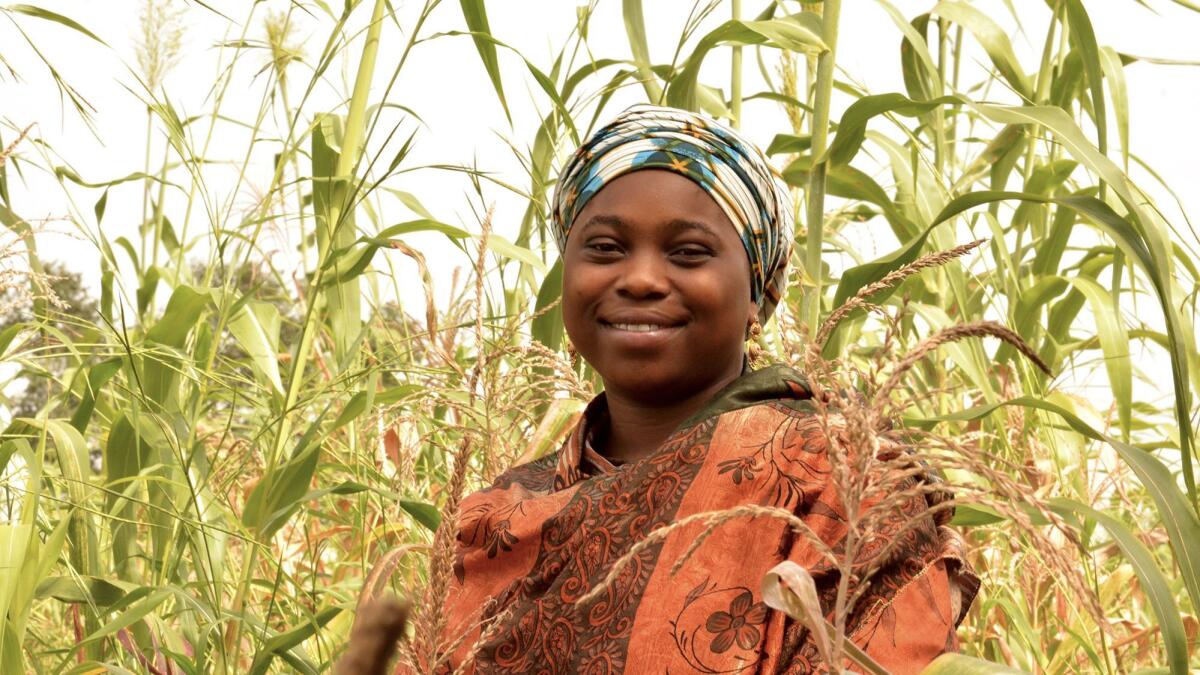Can a group of idealistic young graduates succeed in Nigerian farming, when so many others have failed?

Aisha Ali pressed through a tall field of maize. Her turban, bright flowing dress, soft shawl and careful makeup looked a little out of place on this farm.
Her farm.
In northern Nigeria, most farmers are uneducated men who plant and harvest to survive and get little respect from urban folk. Ali grew up in Kano, the country’s second-largest city, and graduated from college with a degree in microbiology.
“When I tell people I’m farming, they say, ‘Really? After graduating?’” she said.
Ali also has a part-time office job to raise extra money, but her career choice is part of an effort by a local nonprofit to create a new class of young, educated commercial farmers — and in turn change the image of farming and eventually boost agricultural production in a country unable to feed itself.
Nigeria, like much of Africa, imports a great deal of its food. That has made it particularly vulnerable to economic slumps, including the current recession caused by a decline in the price of oil, its main source of income.
With only 40% of the country’s arable land under cultivation, the obvious solution is to grow more food. Nigerian President Muhammadu Buhari recently urged citizens to do just that.
It is time to go back to the land.
— Muhammadu Buhari, Nigerian president
“It’s time to go back to the land,” he said. “We must face the reality that the petroleum we had depended on for so long will no longer suffice.”
But in Nigeria and across the continent, farming is highly inefficient. It takes place on small plots, with each family focused on trying to feed itself, planting and weeding by hand. Production suffers from a shortage of tractors and fertilizer that results in yields that lag far behind the global average.
For those farms that do produce a surplus, bad roads make it difficult to transport crops to market. Better seeds and fertilizers are pointless if there is no way to sell extra food.
The United Nations says that improving farming techniques and yields is the only way to achieve its Sustainable Development Goals of eradicating poverty and hunger by 2030. The good news is that there is wide room for improvement, with farm productivity in Africa at just 40% of its potential.
While the U.N. has focused on improving the lot of subsistence farmers, the program that Ali joined approaches farming as a commercial venture.
The nonprofit Co-Agri is training 150 college graduates who live in Kano and had little or no farming experience. Each receives 2½ acres, an experienced mentor and training in selection of seeds, fertilizers, weed killers and farm machinery.
“Local farmers are farming for food. They’re not commercial farmers,” said the group’s research director, Adam Salihu. “So we are trying to commercialize farming with our graduates. We are introducing them to mechanization, unlike the local farmers.”
Efforts to mechanize and commercialize farming in Nigeria go back more than 40 years. Many projects have sunk. State governments cleared land and brought in seed and fertilizers after 2000, only to see people sell them, instead of farming.
“If the government cared, and gave us some support, maybe some of us could have been large-scale farmers by now,” said Ismail Yusuf, a subsistence farmer here in Yarkawo, south of Kano, who also drives a motorcycle taxi.
Civil servants, government officials and city businessmen have shown up at times to start up farms as part-time ventures. They usually fail.
To some of the local managers they hired, the city investors were wawa, or fools — easy prey for scams such as overcharging and stealing a share of the harvest.
When the students started out, Saminu Sani, a farming mentor for the program, believed they would fail. So did some of the local farmers.
“They’re fortune-seekers,” Yusuf said. “They think they can come here and till the land and make easy money. Naturally, I am skeptical. These guys were never raised to be farmers. They just come overnight and think they want to be farmers, in this grand way.”
The first time Ali showed up to help clear the land, the farmers gaped. An independent city woman who wanted to farm — it made no sense in a country where women own less than 1% of the land.
“In this society, Nigeria and other African countries, women face limitations,” said Ali, who is 25. “There are a lot things that women are not allowed to do for a career. It’s very common to hear criticisms of women who work when they are married.”
To avoid becoming the next “fools,” Ali and other young trainees in Yarkawo report to Sani at least three times a week. If there are pests or disease, he tells them what to do.
Most of the trainees spaced their crops too far apart at first and wasted seed and fertilizer. But Sani quickly corrected them.
“In a short time, they began to master it,” he said.
The new farmers were defying expectations.
As she walked through her 8-foot-high maize, Ali relished in the feeling of success.
This year her farm delivered a bumper crop. She was already planning what to plant next.
This story was reported with a grant from the United Nations Foundation.
Twitter: @RobynDixon_LAT
ALSO
This Nigerian man cannot stop giving: food, money, cars, shops, even houses
Wells are about more than clean water in remote Kenyan villages. They’re also symbols of empowerment
In a Nigerian mechanic’s yard, life lessons and hope for a new generation
More to Read
Start your day right
Sign up for Essential California for news, features and recommendations from the L.A. Times and beyond in your inbox six days a week.
You may occasionally receive promotional content from the Los Angeles Times.






